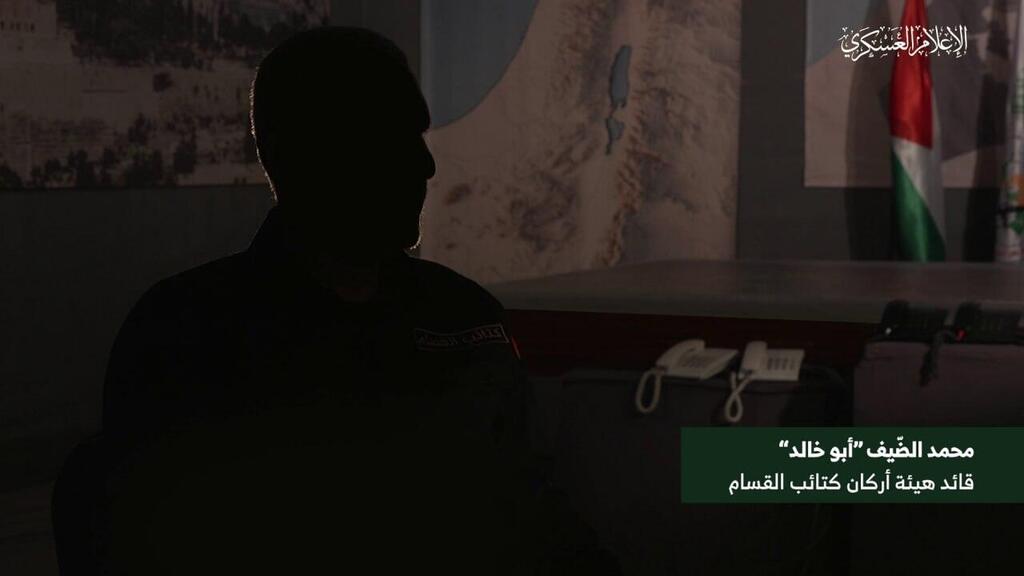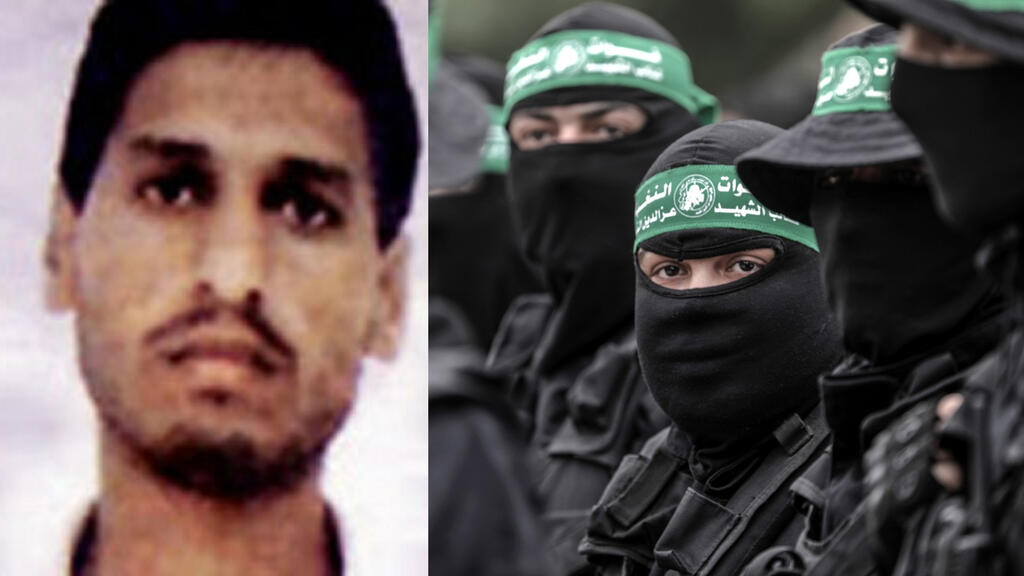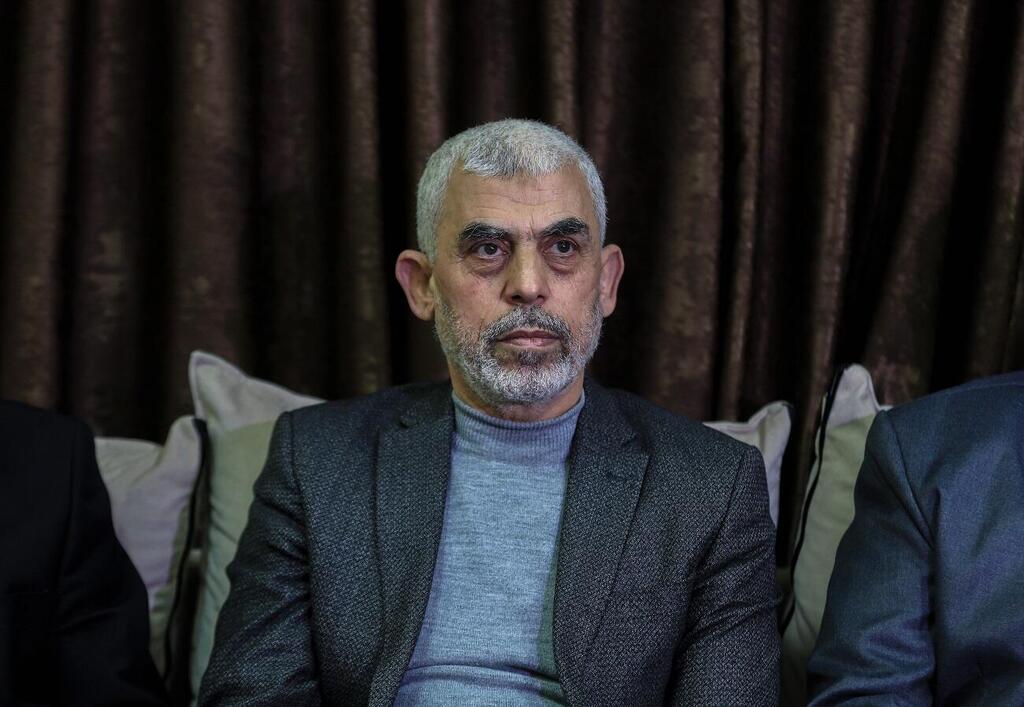Getting your Trinity Audio player ready...
The voice of the head of Hamas' military wing fell silent less than ninety minutes into the unexpected onslaught. Since then, there's been radio silence. The Hamas leader in Gaza relayed a single message on his behalf as the war erupted. Nothing more.
Read more:
In stark contrast, in Israel, the IDF leaders and commanders articulate declarations and host near-daily press briefings. Meanwhile, the chiefs of Hamas in the Gaza Strip remain hunkered down in their bunkers, maintaining an unbroken silence. Adding to the enigma, the terrorist organization they represent has also refrained from issuing statements on their behalf.
In the early hours of October 7, before the clock struck 8:00, a message from Muhammad Deif, the leader of Izz al-Din al-Qassam, Hamas' military division, pierced the silence. "We've issued our warnings to the adversary before," he proclaimed in a ten-minute audio clip, and urged the infiltrators at the Gaza border to: "Execute your assaults using all available resources and tactics."
Deif directed his words towards the Israeli Arabs, stating: "To our brothers in the country's interior, in the Negev and the Galilee, ignite the ground beneath the invaders. The moment has come for all Arab and Islamic forces to converge, to purge our sacred sites and land of the occupation."
He went on to say, "Now is the time for anyone who possesses a rifle to brandish it. Everyone should mobilize with their truck, vehicle, or axe. Today ushers in a new era, a prouder chapter. Today is the day of the grand revolution to free our land." Despite Deif's impassioned call to arms, his words failed to incite action. Unlike 2021's Guardian of the Walls, no skirmishes flared up in the cities he mentioned.
"Our brothers in Algeria, Morocco, Jordan, Egypt, and other Arab nations, rise and heed the call," he urged - but his aspiration for widespread mobilization across Arab countries also went unrealized. At the conclusion of the recording, Deif declared the commencement of the Storm of al-Aqsa operation, and since then, his name has been conspicuously absent from any discourse. Four days subsequent to this, an attack targeted Deif's paternal home, reportedly resulting in the death of one of his brothers and several family members.
Always a rather mercurial and elusive figure, Deif is a true phantom, with only three known photographs in existence - one from his youth, another featuring him in a mask, and a final image of him cloaked in darkness, used in the broadcast of his recording at the onset of the war. His exact location at the commencement of the conflict was uncertain, but it's widely believed he took refuge in one of Gaza's tunnels. An Israeli security official asserted that Deif was instrumental in the orchestration and execution of the terrorist attack.
On October 28, Yahya Sinwar, the Hamas leader in Gaza, delivered what would be his first and only statement, asserting, "We are instantly prepared to strike a deal that entails the liberation of all prisoners in jails in return for the release of all detainees held by the resistance." Brigadier General Daniel Hagari, the IDF's spokesperson, dismissed his proclamation as "psychological terrorism."
A few days following the unexpected assault, a source with close ties to Hamas revealed to Reuters that the decision to initiate it was a collaborative resolution made by Deif and Sinwar. However, the mastermind behind the operation was clear. "Two minds, but a single architect," he disclosed, implying Deif.
As Deif continued to lurk in the shadows, Sinwar's name was repeatedly invoked by Prime Minister Binyamin Netanyahu, Defense Minister Yoav Gallant, and Chief of Staff Herzi Halevy. Halevy, on October 12, commented on the atrocity perpetrated five days prior, declaring, "Yahia Sinwar, the ruler of the Gaza Strip, chose this detestable attack, and hence, he and his regime are dead men walking."
On November 4, Gallant asserted, "we will track down Sinwar and neutralize him," and during his statement, an image of Sinwar and his brother Muhammad, another high-ranking Hamas member, was displayed in the backdrop. Come November 7, the Defense Minister professed that "Sinwar is sequestered in a bunker, cut off from the world. Our commanders are leading the forces." Netanyahu drew a comparison between the Hamas leader in Gaza and the infamous Nazi dictator, stating, "Sinwar is indifferent to his people, acting like a mini Hitler in a bunker. He finds the welfare of his people entirely irrelevant."
But these two aren't the only ones who, at the starting stages of the war, were conspicuously absent. Hezbollah chief, Hassan Nasrallah, was also nowhere to be seen. Prior to Nasrallah's inaugural address, Hassan Fadlallah, a Hezbollah representative in the Lebanese parliament, stated: "Nasrallah is closely monitoring the evolving situation in Southern Lebanon and Gaza, overseeing the direction of the battle alongside the field commanders. His absence from the media spotlight is a tactical part of the battle management. He will make his presence known when he considers it appropriate."
The conspicuous silence from Nasrallah at the onset of the war sparked numerous speculations, particularly as it was a deviation from his usual verbosity. Many interpreted this as a deliberate strategy to disorient Israel. This hypothesis was fueled by Nasrallah's past silence following the assassination of the terrorist at the Megiddo Junction, who was believed to be a Hezbollah operative. Nasrallah justified his reticence during that episode by saying, "Silence is part of a political, media, psychological, and military battle against the adversary. This silence signifies wisdom and bewitches the enemy. Sometimes the best response is no response at all."
Unlike Deif and Sinwar, Nasrallah has already taken the stage twice for extensive speeches, following a gradual increase in media presence that began with a letter addressing the deaths of Hezbollah operatives and continued with his meetings with top-ranking officials of Hamas and Islamic Jihad, as well as with his speeches.




